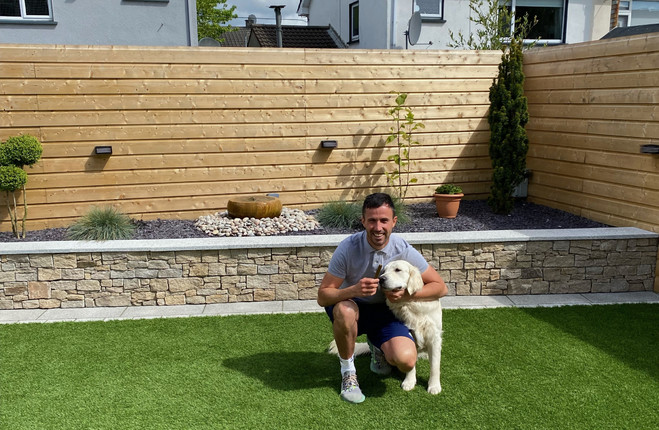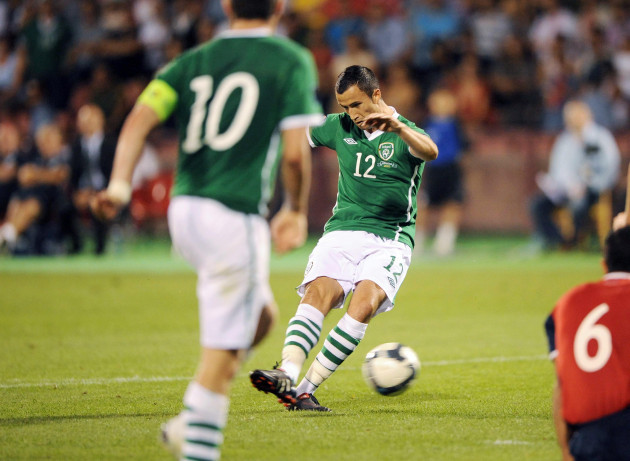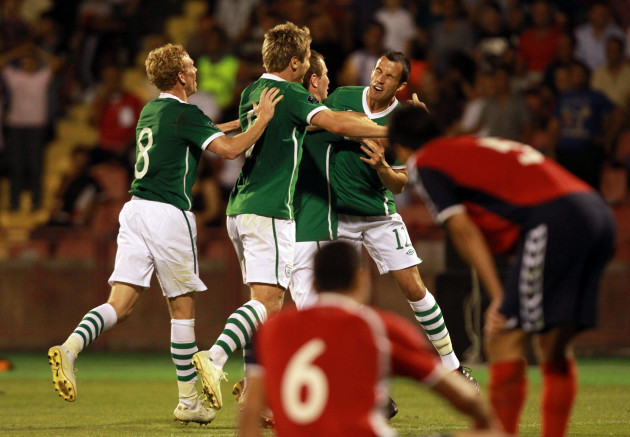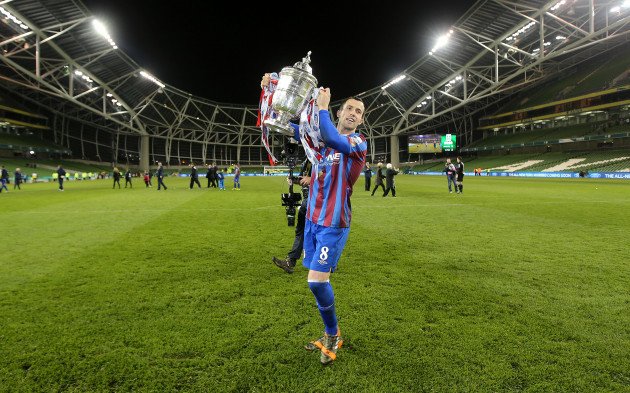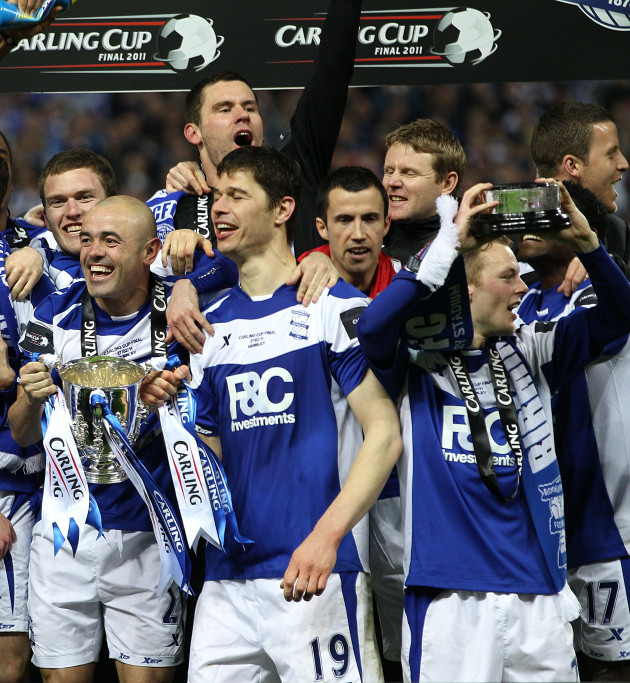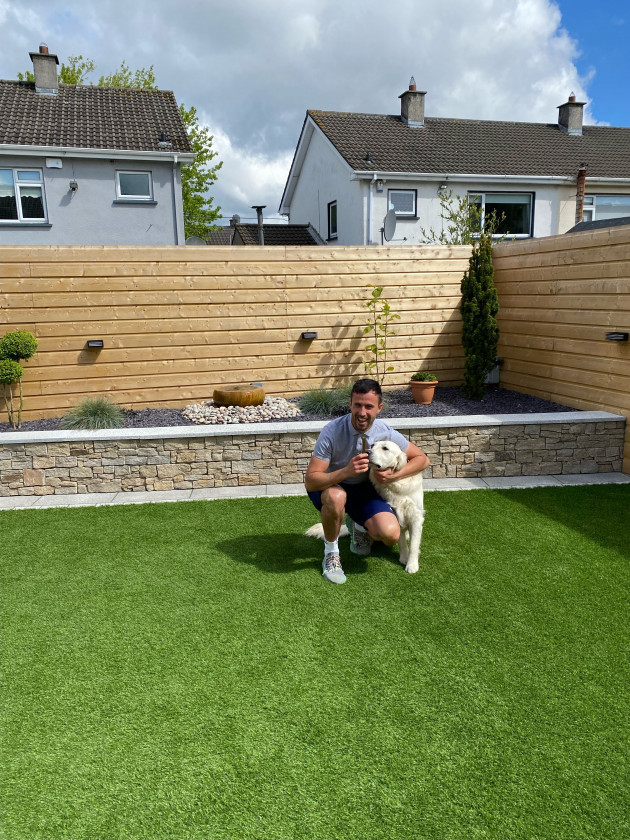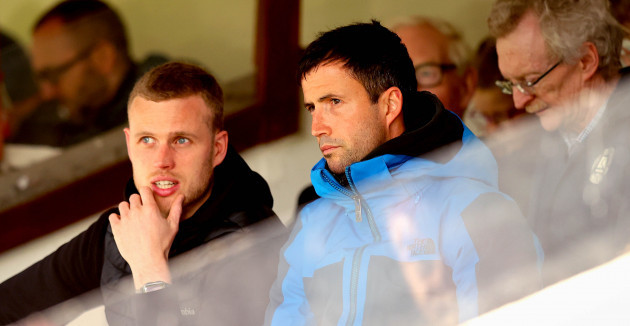PNEUMA IS A beautiful 11-month-old Labrador who is waiting by the front door.
As the car pulls into the drive and a stranger gets out, the porch slides open. He strides over, weighs up who is on front of him before rising on his hind legs and burying his face affectionately into The42’s midriff.
This is a good start.
“I hope you don’t mind dogs,” Keith Fahey says with an inviting laugh.
Pneuma leads the way to the kitchen and nestles down in front of his food bowl.
This is the house Fahey grew up in, the one that was left to him and his older brother after his father passed away following a battle with cancer in 2009.
Tallaght is home, this is where the 39-year-old feels “comfortable”, yet the memories here range from comfort to chaos.
But they are his memories to tell, in his words.
It is 10 years since Fahey should have been a part of the Republic of Ireland’s Euro 2012 squad, a groin injury forcing him out of Giovanni Trapattoni’s plans before the first warm-up game against Bosnia & Herzegovina at Aviva Stadium.
Then a Birmingham City player, he lifted the League Cup at Wembley in February 2011 after beating Arsenal 2-1.
A photograph of that success hangs in his office.
Arsenal, coincidentally, were his first club in England, joining as a teenager before moving to Aston Villa.
He returned to Dublin and thrived as well as suffered in the League of Ireland with St Patrick’s Athletic and Drogheda United, respectively, before earning that move to Birmingham on the back of his form with The Saints.
His time at Birmingham led to his senior Ireland debut as a second-half substitute away to Armenia in Yerevan, his goal off the bench forging the path to qualification for Euro 2012 with a vital 1-0 win.
He recently had four different snapshots of that strike framed, but has yet to hang it up.
Ireland are back in Yerevan this weekend for the start of a new Nations League campaign.
Fahey is in a completely different place, and he is open to inviting us in.
…
David Sneyd: Armenia in Yerevan. Remember much of the game, the goal, what was happening around the match for you?
Keith Fahey: I remember the heat, real heavy kind of heat. I remember through looking back at pictures, really. Getting on the pitch and being nervous, not wanting to do anything wrong. Was it the first game in the [Euro 2012] qualifiers?
DS: Yeah.
KF: And it turned out to be such an important goal, which is great for me, for who I am to have that kind of memory.
DS: Why do you say that?
KF: I’d say I had a fairly modest career. Modest. Done fairly well for who I am, where I’m from. My whole story. I didn’t play in the Premier League or Championship like most of the lads do for eight, nine, 10 years. Do you get me? It’s nice to have that memory. The pictures, [Giovanni] Trapattoni putting me on, having the chat with me, whatever he was saying. I don’t mean that in a negative way, the way people might portray it, but I was eager to get on.
And the way the ball just fell to me, it wasn’t an easy finish either. There wasn’t much of the goal I could hit but I was always quite decent at finding something with a bit of vision and being able to execute it, I was able to pick out the corner. It just kind of squirted out to me. I’ve watched it a few times.
DS: When the ball comes out to you, you can tell in your head you’re thinking, ‘This is how I have to hit this shot’.
KF: Yeah, I’ve picked out the bottom corner and put a bit of pace on it because there was a big guy in goals too. Just very lucky, very blessed to have that memory. John Barrington, the St Pat’s photographer, was right there. He got some good shots and he gave me the photos a couple of years ago, and literally in the last couple of weeks, do you know the framing place on the top floor of Stephen’s Green, I was in there and said ‘I’ll try and get these framed’. The four pictures. It’s a very nice memory to have.
The stuff around it, for me, again, who I am. Looking back, I was so trapped in myself that that’s all I could experience, really. I remember how it felt being in a hotel for so long. When I was training, I was free; when I was in a hotel, I was trapped. That was me. The stuff around the games, internally it was a lot of pressure. It wasn’t a game of fun to go out and express yourself and be free. It was like, ‘There are thousands watching you, there are people slaughtering you’, and all that sort of stuff. That’s how I tick.
DS: The first thing you mentioned is that you had a modest career but you’re one of the few Irish players in the last 20 years to win a major trophy in England.
KF: I know, I know. And I’ve been very lucky. The spell in Birmingham, just very fortunate. Getting promotion [to the Premier League]. It was like a wave for those few years and then it drops off. I had a part to play in it which was great but I’ve just been very lucky. I’ve persevered in my career as well, I’ve persevered through all the madness behind the scenes. And got my rewards as well. It didn’t all go my way, which is good. You need to learn as well through some tough times.
DS: Those rewards… the perseverance, that success is the reward for that perseverance.
KF: Football gave so much to me. As a child it was definitely my identity. It was mine. Nobody else could take it. I didn’t listen to people. I done what I wanted. It was my relationship with football, I was intense in it because without it I wouldn’t have probably got through life to be honest.
Football, people bate it with a stick, ‘They don’t do enough’, and all that. At times I’ve probably done that myself but looking back, my experiences, football absolutely took care of me. It took me in and carried me through. I wouldn’t say spit you out, it’s hard to let go of a relationship. To actually let go of it. In the last few years I’ve grieved and moved on and let go of football. Because it’s not who I am, it’s what I done.
There is more to me than football. I do challenge people on the street when they literally just stop and say, ‘Ah, would you not get back in to the football?’ It bugs me. That’s all people see. It’s like, ‘Hold on, hello’. Yeah. I’m pretty resilient internally. I had to be as a young fella, as a child, as a teenager and a young man and an adult as well. Now I’m resilient through other ways, through prayer. That lightens everything, that gives me a bit of grace in my life, that it’s not all this way or that way. I stay close to God through prayer.
Things weren’t as bad when I look back now. It was just how I felt at that time. I felt alone, I felt not worthy. They were feelings but they weren’t true. Now I stay in the truth, I speak the truth and I share the truth. I’m free. I’m free to talk about football in a different light now.
DS: You’re not trapped by those feelings of before. You’ve gained a perspective over the last number of years through asking yourself different questions and wanting to learn more about why you were feeling certain ways?
KF: I’ve spoken before about my family growing up. My family broke up when I was young. It profoundly affected me. I didn’t do any healing. So I went looking for it in other areas, and I found it. But it was all very short term and false. I was always looking for a short-term fix for a long-term problem.
Now I don’t mind suffering in the short term for long-term peace. Suffering is a part of life. But when you’re stuck in it and you’re full of self-pity and ‘Why me?’, it’s not a nice place to be. I’m free now to stay close to God, I choose that. I’ve found through all the madness, addiction, caught up in addiction for 20 odd years and hiding it. Lying and deceiving and not being free, constantly worrying, ‘Did someone see something? Will someone say something?’. It’s not like that now.
I was found through all that madness. I didn’t see how bad things were. I couldn’t see it. There was a blind spot, a massive blind spot in my life. I was found in the middle of all that. I felt that I wanted to stop, but I couldn’t stop doing what I was doing. I started practicing a different way, which is difficult to change, and things started to change. It’s not easy to change. Even now change is tough, change gives you a lot of pain as well.
DS: Has accepting that you were the one who had to change been difficult?
KF: It’s an awakening. Call it a breakdown as well. A breakdown is usually an awakening. I ended up in a treatment centre having played for Ireland. You can call it whatever you want. Four years ago, I went in for treatment, I went to rehab. And rehab isn’t — my experience of rehab wasn’t pretty. I don’t know what other peoples’ experiences of rehab are. It’s a grounding, I wouldn’t say breakdown, it’s a seriously humbling experience by the way. ‘I played for Ireland, what am I doing here?’ It’s like, ‘No, Keith, you brought yourself here’.
Was it difficult to change knowing that it was me who needed to change? To be fair, I’ve always felt alone anyway so I knew I had to change. Yeah, it’s difficult, but I just started practicing a different way of life and started doing things a lot differently to how I had been.
I cut people out of my life who I would have used, they would have used me. That’s constant. People come into your life, and they leave. I’ve done hundreds of hours of counselling and I still do it. I have something in me that wants to be a better person and I can’t do it without prayer, I can’t do it without God. I can’t do it without Jesus. I absolutely can’t. I’ve realised that through experiencing it. It’s not something that I’m reading, it’s something far deeper and very real.
DS: Does that feeling with God mean you don’t feel alone? Is there other family there or is God the constant for you?
KF: That feeling of feeling alone? It’s not true. God is with me. It’s not true that I am alone. It’s absolutely not true that I am alone. I go back to the faith, without it I am a train wreck. I didn’t have any discipline other than football. I done what I wanted. I had no real morals. I was taught through deceit and stuff like that. That’s how I learned.
DS: Over the last number of years have you felt that it’s not you by yourself?
KF: I’m not alone. I can talk to God, I can listen. I can read the Bible. I can pray. Meditate through scripture. It’s only good if you’re open, which I am. I wasn’t before but I am now, and I just keep walking that way because I started becoming the person I’m supposed to be rather than the person the world created for me.
I don’t like saying addict anymore. Stuck in a cycle of addiction, playing football in front of people, smiling for people with the cameras then doing something away from it that you shouldn’t really be doing. To ease the pain that you’re feeling internally, putting on a smile, going home and feeling that you shouldn’t even be doing that. Feeling shameful.
DS: Around that time, playing for Ireland, scoring that goal in Armenia and being in what would be the most successful part of your career – getting promoted, winning the League Cup, being a Premier League player – but at that time for you, what are you feeling about yourself?
KF: Training, having a ball at my feet, that is when I was free. Then the other stuff, I wouldn’t have felt comfortable being around a lot of people. Where I come from is again like, I was used to isolating. Then people want a piece of you, you do interviews. I was always worried what people would think.
These things going around, people talking about mental health, [but] emotional health is another one that isn’t spoken about. I didn’t develop emotionally so I took everything personally. It was always about me. The hurt I’d feel inside. It doesn’t take much for me to get upset now. I’m sensitive. I’m very sensitive, and that’s OK. That’s who I am.
That’s how I would have been. Football, at work, whatever it is, people want to fit in. All that sort of stuff. You’re just like ‘no, stop’. I think a lot of people suffer from what I was suffering with, maybe not to the level I was, but in life generally people just want to fit in, and they start to become people they’re not. That’s just an opinion. They lose who they are just to fit in. I’ve done all that. Putting on the face, the smile. But then going home and looking at myself: ‘Who are you? Is that you or is this you?’
Now it’s like, right, I have a very authentic, real relationship with Christ. That then shows me how to be with people. I’ll be real, I’ll be honest, I’ll be truthful. If people can’t be that way with me, it doesn’t work. I think we are encouraged as people to be honest and to share and not bury stuff inside us because it’s not healthy. It comes out in other ways. I was conflicted constantly within myself.
DS: How were you able to function as a professional footballer at the level you did?
KF: I’ll tell ye. I don’t know what people’s understanding of addiction is. Early on in my childhood, in my teens, I used to just drink till I was in trouble and wake up having not remembered. Getting into fights, crashing mopeds, crashing cars. All that sort of stuff. That was just me acting out as a teen.
But it didn’t stop as I got into my 20s. I started to lie a lot. Not in training, I’d be missing things because I would still be out. I learned to deceive and lie. As I got older, I went to Birmingham and more so to the end of my career there, I would be coming back to have a blow out. I’d come back here and run amok for the summer. I’d come back here and be out constantly. People will be shocked, people won’t be shocked, people might not want to read it because it might shine a light on their own stuff, but that’s the reality of humanity.
There was something feeding all that internally and it wasn’t good, then you have people kind of nearly enabling you. Hangers on, friends, if they are friends. It’s the need to fit in again and the long for belonging, I suppose. You learn to function, you learn to cover up. Until you can’t.
DS: You say you learn to deceive, but did you feel at any stage that you need to go and speak to someone or feel you could just keep going the way you were?
KF: Can you catch it earlier? No, I didn’t think I had a problem. I was deluded to think I hadn’t got a problem. We’re all a bit deluded in some shape or form. I say that and I accept it. There’s nothing wrong. I don’t look back now with shame. I look back now and try and tell the truth. It will divide opinion of what I’m saying and who I am but that’s none of my business.
DS: I don’t understand the addiction you’re talking about, but one of the first points you made was football helped you with a structure. Could it have been worse without it?
KF: Absolutely. I probably wouldn’t have been here without football. To carve away at it as I did, I found a way to live. Football has given me far more than I thought it had given me. I look back and I believe what I was doing, the cycle I was in, was because I didn’t pray. I was very selfish, and I had to be selfish at times in my life. I didn’t pray and I didn’t have God at the centre of my life. I bring God into the centre of my life and things changed.
DS: When did you realise that was needed? It’s not one moment, it’s bit by bit and you have counselling, you go into rehab — when do you get to that stage where that faith and belief in God becomes imperative?
KF: That can be different for people. I was seeking help. I was going to counselling and still stuck in addiction. But I said I was going in for treatment. I listened in treatment, I listened to what it was all about and all I see was ‘God, God, God, God, God. Do you believe there is something out there?’
Now that I was asked the question I was like, ‘Yeah, I do believe. Absolutely’. Considering all the work I had put in with counselling, I still wasn’t able to get free. I was still getting some sort of help and was still showing up. I ended up in treatment and started to pray because that is what was suggested. I found a way to live. Prayer. I missed the discipline of football even though I was still off the rails while playing football.
I had no structure and when I started to pray, that brought structure into my life. What happened then, the smallest thing, I used to put a pillow at the end of my bed on the floor to remind me to pray. To give thanks at the end of the day, in the morning to ask for help. I went through recovery circles over the last four years. The last two years, I was still seeking. I didn’t know God, I knew there was a God, but I was like, ‘Where am I going with this?’ People would say things to me about love and forgiveness, but I couldn’t picture what it looked like. I was thinking of words and trying to meditate on words. I was tormented then in my mind. So, I was like, right, ‘I need something here. Something is not quite doing it’. Around that time a friend of mine sent on a link to a course of seeking around faith. It was a link to an Alpha course.
DS: What’s that?
KF: An Alpha course is basically the foundations of the Christian faith. It’s an open kind of thing. You are open to say what is in your heart or on your mind. And you are able to challenge things. I had never heard the truth. The way it was delivered, you learn about Jesus and what he has done for all of us. I had never heard that. You can invite him into your life. It’s pretty simple. That’s the game changer, and I’m so happy to be able to share it. You invite him in. He’s knocking ever so gently waiting to come in, but you have got to open it from the inside.
I remember my counsellor saying to me, ‘Keith, it’s like there’s a cage around your heart and you won’t let anyone into it’. I was like ‘Wow’, and when I can think visually like that I was like, ‘Right, how do I get the key into this lock and get it open?’
There is something very spiritual in me. It’s probably in us all but I’ve gone far to get there. When I could visualise that, it is when it started to help me. Then after inviting Jesus into my life things changed dramatically. I was freed from the physical substance abuse. God had freed me from that but I didn’t know Jesus. Jesus freed me from the shame, the doubt. I’m forgiven for what I’ve done. It’s me that needs to let me off the hook.
DS: I don’t understand what you would have felt the need to feel shame about?
KF: I internalised everything and thought, ‘Did I do something wrong?’ That was a constant. I used to go into rooms and come out thinking, ‘Did I say something wrong?’. It was all that sort of stuff. That’s my understanding. The Bible for me is the truth. God loves us so much and he sets us free from all that through his son Jesus. Jesus has opened up my heart and He’s softened my heart. There is constantly stuff that I need to get free from. That’s just life, but I am not able to do it without practicing prayer, meditation through scripture.
It’s not just about going to church. I met Jesus and now I got to church. I met Him through Alpha, through an experience of love flowing into me like I have never felt. I have never felt that. A wave of different emotions.
DS: What could you feel that was different and would allow you to open your heart from that?
KF: I was praying, seeking. Those who seek find. After a couple of weeks, I had been going to the [St Mary’s] Priory Church down below [in Tallaght]. Just going down and sitting in the church. I didn’t know why. Sitting there one day, Jesus on the cross, I just started bawling crying. Just felt a wave of different emotions – peace, joy, happiness, relief. That my past is going to serve a purpose for the future. I was like, ‘Something is after happening to me’, and it set me free. After that I learned to get closer to Jesus. I read the Bible. I pray and go to faith groups to talk about Him openly because I don’t like the truth being hidden. I’m very open to sharing about Him because without Him I’m not able to live properly.
DS: Do you feel the life you have now is the one you want?
KF: Yeah, it is. We always want something further along down the line. Where I am at, there is movement, and I am growing constantly. I stay close to God during all of that and trust Him.
DS: How have relationships for you changed? With family and friends and people in football, have those relationships been strengthened through this?
KF: I would say, from my experience, some people, me and other people, sometimes you just move on. In the past I would have wanted to hold on to everything. Even if it was unhealthy, I’d be like, ‘Hold on to that’. If it’s unhealthy, I just let go of it now. We are all a bit broken and not perfect but God, for me, the love he provides, is there in bundles. You just have to open the door and let him in. I thought I just had a problem with addiction. I didn’t. I had a lot more problems and there is a lot more help there. God will keep showing me. It’s constant.
When did I believe or realise this is so important for me? It was gradually. That’s a constant, I do realise, ‘Wow I need it in every area of my life,’ because I’m showing through life. Sometimes I’d be like, ‘Right, maybe I’m trying to do something just Keith wants to do’. There is just a lot more grace. I feel grace in my life and I know that I’m doing God’s will. That’s all I want to do because I believe he has work for me to do. I don’t know what way that looks. Before you say anything I’m not becoming a priest! [laughs]
There were a few jokes about that a few weeks ago and, listen, priests do great work, great work. A few people started saying ‘Ah, we’ll see a white collar on you soon’. But no, I believe my calling is family. Marriage, family, kids. My own family. I hope I’m called to marriage. For now I would like, to be honest, to put on day retreats for teenagers. People find it hard. The world is so busy. It’s constant. We all get stuck in that and for me it’s nice to just go, ‘You know what, park all that stuff’. Try and get into a routine of retreat through prayer. That’s where I find my peace.
DS: You mentioned before about pulling people up when they say about getting back into football, but I do think that comes from a place where you gave people a lot of joy playing.
KF: Playing football. It’s not the same [as coaching]. People get into coaching and maybe there is a bit of fear of letting go. I tried that [at Shamrock Rovers] and was like ‘I don’t like coaching’. Give me a ball at me feet! I love having a football at my feet and I’ll never lose that. Just the feel of it. I’d have a tennis ball in the utility room. That is how it started out, but it didn’t keep going that way.
DS: Talking about realising things about yourself, do you realise that you would have brought a lot of joy and happiness to people as a footballer. You spoke about shame but there is also joy there too.
KF: I struggle to accept that. At the head level it’s like, ‘Yeah, you did’, but the heart level I need to learn to receive. That’s work I need to do. I want the head and the heart to work together because that will make life easier. The heart is still a little bit, around that stuff, ‘no’.
DS: It’s 10 years since Euro 2012. You got injured before the warm up game against Bosnia. Some couldn’t let go of that happening to them, that they were so close to going…
KF: I was injured anyway. It was a long aul season. I had surgery at the start of the season, I think it was, and that got me through a lot of the games. I was in a lot of pain. I was picked, so it was like ‘show up, turn up’ and I literally in the first day of training popped my groin. Then I couldn’t warm up or run before Bosnia. You can’t get everything your own way. That’s just part of my story. I was chosen to go and obviously I was very upset. But I knew I wasn’t 100%. When I look back now, like everything else in my life, it’s just a part of the story. Look, it’s good to be able to share. If people want to be hard on whatever they read, let them. This is something that I have experienced. I am forgiven for the stuff that I have done. I try and forgive myself, it’s me that needs to let me off the hook.
Let’s put the footballer tag to the side for a minute. And that’s why I would encourage people to look beyond ‘the footballer’. Footballers themselves need to realise there is something deeper in the core of you. Not just the football. There is a big identity crisis. There are a lot of coaches thinking that because they’re in football, they’re something, they’re hanging on to something. Hold on. Let go [laughs]. I struggled to let go of football. There was a fear. I coached and was like, ‘Do you know what, there are too many know it alls in this game’. There are too many that won’t let you thrive because they fear losing their own jobs. There is too much of that nonsense for me.
DS: Your relationship with football changes. You were at the St Pat’s match against Shels a couple of weeks ago so it’s not as if you don’t want to be around it?
KF: That was the first time in a couple of years. I’ll watch a game on telly. Whatever game is on RTÉ, sometimes I’ll watch LOI TV. In general, Premier League, Champions League, don’t ask me who is signing for who. I have absolutely no interest in it. People will be saying to me ‘I find that very weird’… Yeah, it must be. I’m glad. I’m moving in a different direction and I’m not saying I won’t go back into football, but if I do it won’t be coaching or anything like that.
DS: You talk about retreats and helping young children, have you seen some of the work Richie Sadlier has done with his book and going to young players at Crystal Palace to talk about sexual consent, porn, sex, addiction. Something clubs are beginning to realise to educate their players who feel football is their life but to try and make them a bit more rounded…
KF: I believe it starts at home. From my experience. Did I have to do the things I done? Addiction. I did. There needs to be some help given to teenagers to offer them a different way. It’s in my heart to share my experiences, with teens especially and make them realise there can be better choices.
DS: This is the house you grew up in. This area, the people here, it’s something you have a closeness to and don’t want to forget.
KF: I would have had an emotional attachment to the house. My father worked very hard to eventually, God rest him, leave the house to me and my brother. I’m comfortable here. Who knows what way the future is going to bring me. I’m open to change and open to following whatever path might be chosen for me.
